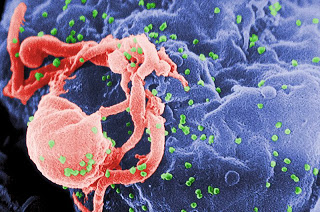Organ donation from HIV positive patients has been prohibited in the USA since 1988. Pre-transplant screening for HIV is mandatory using nuclear amplification test (NAT), though false negative results during “window period” are a potential concern in donor selection.
Elmi Muller spoke at our Transplant Grand Rounds yesterday and told us about the challenge she faces in South Africa, where HIV infection affects more than 15% of the population, HIV patients frequently develop HIV-associated nephropathy (HIVAN) and progress to ESRD. Moreover, the availability of renal replacement therapy (hemodialysis) is limited.
In the early 90’s, there were a number of uncertainties related to transplanting HIV positive patients including the worrisome concern about introducing a donor-derived virus that could lead to out of control HIV infection (resistant strain?); the effect on the immune system of HIV infection in combination with immunosuppression (worse immunodeficiency?); and the financial burden of expanding the services of transplantation to HIV+ patients in a country with limited health budget.
Against all the odds, Elmi performed four cases of HIV positive kidney donors to HIV positive recipients in South Africa in 2008. No IRB approval… Elmi reported having some intuition that it would work and she was in touch with other physicians around the world who shared her view. In her side, HIV resistance rate is very low in South Africa.
After performing those transplant, her colleagues and the hospital prosecuted her and banned her from performing surgery for more than 1 year.
This past week, the HIV Organ Policy Equity (HOPE) Act was approved by the US Congress, permitting donation from HIV-positive organs to HIV-positive recipients. It took time but she is now recognized as a pioneer in the field and her courage to perform those surgeries were remarkable. The law that passed will help expand the availability of organ donors to HIV positive patients and will help with organ shortage.
Some challenges though still remain. HIV resistance is much higher in the States (~19%) and HIV+ transplant recipients experience a higher rate of rejection and significant difficulties with drug-drug interactions (P450 inhibitors). Details about a recent trial can be reviewed on this prior blog. In contrary to the idea of over-immunosuppression, recent paper suggests that ATG may be a better induction therapy choice for these patients. Closely monitoring of these patients will be essential as we learn more about HIV and transplantation. By bending rules, Elmi changed a transplant policy and made history.
Naoka Murakami
Leo Riella

